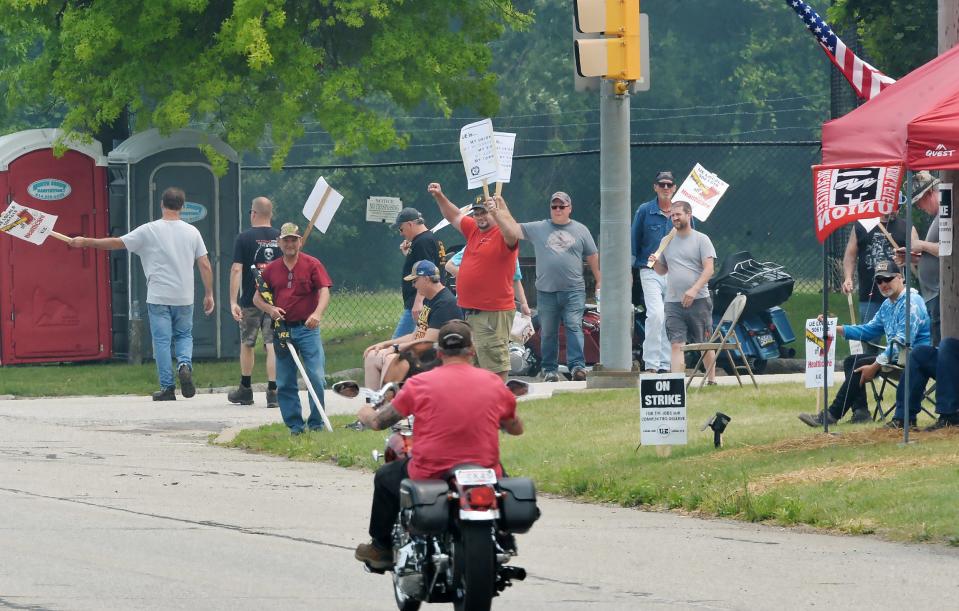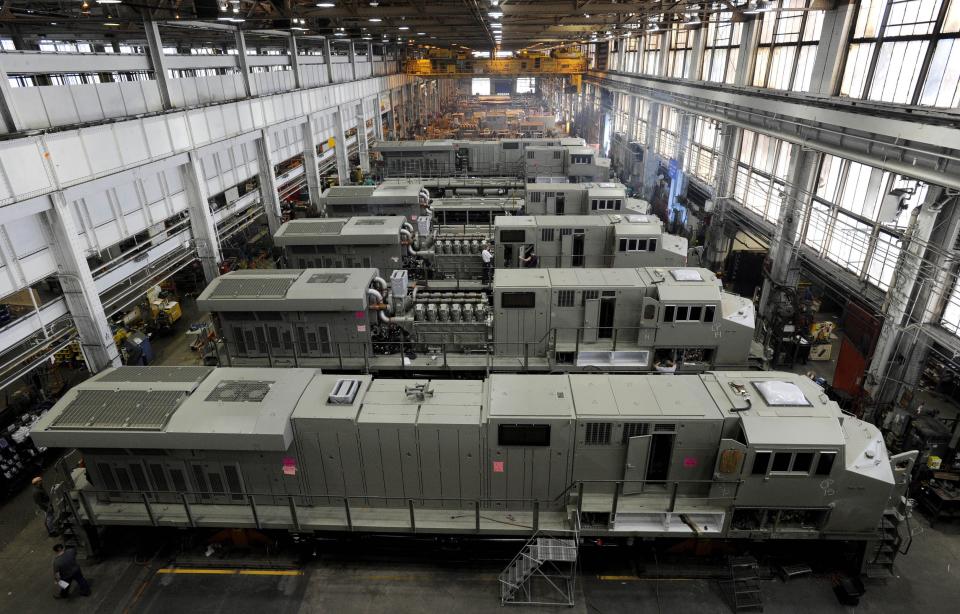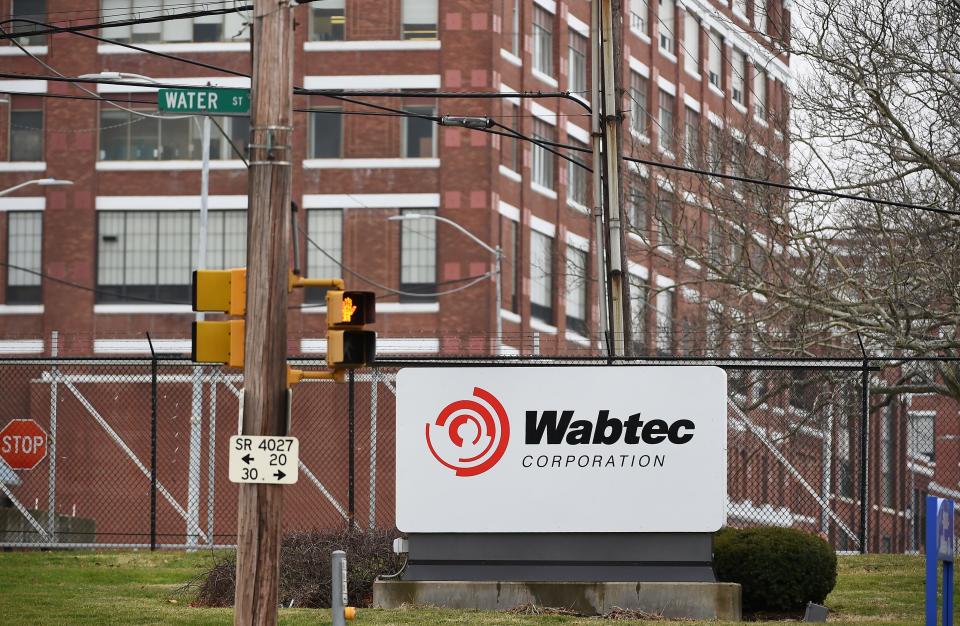What's on the line as Wabtec strike in Erie nears the two-month mark?
There's a lot on the line as striking members of the United Electrical, Radio and Machine Workers of America continue to picket outside the Wabtec plant in Lawrence Park Township.
In a recent opinion column published in the Erie Times-News, Luke Bernstein, CEO of the Pennsylvania Chamber of Business and Industry, offered a worst-case scenario as the strike at the former GE Transportation plant nears the two-month mark on Aug. 22.
According to Bernstein, "Both parties must ask themselves: How long can this strike continue before it spirals into a plant closure?"
Along with his executive board, James Grunke, CEO of the Erie Regional Chamber and Growth Partnership, raised the same question in a recent opinion column in the Erie Times-News.

Grunke wrote: "As the strike lingers with no progress in sight, it is time to face the unfortunate fact that Wabtec will have to begin making hard decisions regarding which facilities to continue investing in and which facilities will ultimately become dormant. To ignore the looming reality that the Erie plant may not make the cut would be irresponsible and is a conversation that can no longer be ignored."
That "would be crushing for Erie and Pennsylvania," Bernstein wrote.
Impact on the community
It would be more than a psychological blow in a community that's been building locomotives for more than 100 years.
It would be an economic gut punch.
The company's Erie workforce of more than 2,000, including nearly 1,400 union workers, helps sustain five local jobs for every job at the former GE Transportation plant, Bernstein said.
"A plant shutdown would lead to an immediate domino effect on local businesses that rely on the patronage of the 1,400 union workers and their families," Grunke wrote. "From small shops and restaurants to service providers and suppliers, the livelihoods of countless other families hang in the balance."
Scott Slawson, president of UE Local 506, which represents most of the striking workers, doesn't minimize the importance of the plant to the local economy. He's spoken of it often, both before and during the current strike.

Do top wages attract the best employees?
But Slawson also believes a skilled, well-paid workforce is in the best interest of the company and the community that benefits from the spending and the philanthropy of those workers.
He said he worries that the company's ability to attract the community's best and most experienced industrial workers will erode over time as legacy employees, who earn an average of $35 an hour are replaced by new workers who start at about $22 an hour and work up to full wages over a period of 10 years.
Slawson, who served as union president for five years under General Electric ownership, said GE took pride in its ability to recruit talent.
"Everybody wanted to come here for the wages and benefits," Slawson said. "They never had a problem attracting talent."
It was rare, he said, for GE to hire anyone with less than seven to 10 years experience, a policy that contributed to the quality of the finished product.

"This is top-tier manufacturing," Slawson said. "We are building locomotives. These things are designed to run for 25-plus years and for millions of miles. They are all hand-crafted and it's not the cleanest of work."
To attract top workers, Slawson said, "You have to pay commensurate wages and benefits."
Progressive wages a sticking point
While a handful of issues stand between the union and Wabtec reaching an agreement, addressing the progressive wage scale remains a key sticking point.
The union, which originally sought to eliminate the phased-in wage scale, has offered several compromise proposals. The most recent proposal would have gradually raised the wages to fall in line with legacy employees over a period of five years.
The company has so far rejected all proposals to change the existing progressive wage scale.
In many cases, entry-level jobs aren't attractive to skilled workers who can make as much elsewhere, Slawson said.
Slawson, whose union is scheduled to return to the bargaining table, along with a federal mediator, on Thursday morning, said there is still work to be done to bridge the gap on health care and other issues.
Slawson described the company and the union as "not that far apart" on the issue of general wage increases.
The union's most recent proposal calls for a 4% raise, followed by subsequent increases of 3.5%, 3% and 3.5%.
The company's last offer provides a 3.4% raise in the first year and a $3,000 bonus on ratification. The contract proposal calls for two more wage increases of 2.5% each as well as another $2,000 lump sum later in the contract.
Slawson said the union's wage proposal is an attempt to make up some of the lost ground after three years of historic inflation.
"Let's face it," he said. "Inflation has gone up by almost 20%. Each (union) member is making almost 20% less than they were four years ago."
Slawson describes community support as "amazing" but said he understands not everyone supports the strike.
"There is always people who come down on both sides of the fence," he said. "You have to keep an open mind and listen to everyone. We have always done that. We listen to both sides whether we agree or don't agree. But it's the 1,400 men and women who work here who have the final decision."
Slawson believes those workers are part of something larger.
'They are calling it the summer of strikes," he said. "This fight isn't just about the 1,400 workers in this factory. It's about what happens in this country as a whole. People are making sacrifices for the betterment of the whole. A rising tide lifts all ships."
Thinking the unthinkable
But what happens if the ship sinks?
Whether the union or the company is right or wrong doesn't change the reality that Wabtec has options, including moving more or all of Erie's workload to its plant in Fort Worth, Texas, or somewhere else.
"The Erie site has been a laggard in terms of cost and efficiency for years, as compared to other Wabtec sites and suppliers," company spokesman Tim Bader said in a statement. "These challenges seriously hinder the site’s ability to attract new or even keep existing production work in Erie."
Bader characterized the union's current demands on wages and what he calls "an unfettered right to strike" as being out of touch with reality.
"To be successful in the long term, the Erie site must be cost competitive, efficient, and provide labor stability," Bader continued.
He also hinted at the potential consequences.: "In this current climate, the Company is being forced to consider difficult decisions to continue supporting its customers and deliver on its commitments."
'I don't believe this is a tactic'
Asked for comment, the office of Erie Mayor Joe Schember referred the Erie Times-News to a July 24 comment from the mayor.
At that time, Schember said, in part: "I support all parties involved in efforts to achieve the common goal of reaching a fair and equitable resolution and a lasting agreement that benefits everyone."
Meanwhile, Erie County Executive Brenton Davis said he takes seriously the possibility that Wabtec would reduce or even eliminate its manufacturing presence in Erie.

"I don't believe this is a tactic," he said. "To me, it comes down to dollars and cents."
Davis, who said he's visited the picket line and spoken with union leadership, said he's also been in contact with company officials.
"We don't take a side in this," he said. "We are on the side of the community. We want to keep these jobs. We want people to make a decent wage. I would encourage both parties to compromise."
Davis said he was in no position to judge who is right or wrong.
"I have no standing. I can make no comment," he said. "I am not a company guy and I am not a union guy. I want to see Erie come out on top and I want Wabtec to feel at home here."
A report from the Erie County Data Center provides Davis a dollars-and-cents picture of what is at stake.
Davis said the plant's 2,240 employees, including nonunion jobs, account for payroll of about $890 million a year. All told, the plant accounts for about $1.27 billion in economic impact, about 10% of Erie County's economic output, Davis said.
"I don't want to take a $1.27 billion hit," he said. "I don't want to lose any of it."
He's convinced, however, that the threat of losing all or a part of Wabtec workforce is real.

"There is no doubt in my mind," he said. "When Wabtec is talking about making decisions, you have to read between the lines."
Davis called repeatedly for both sides to compromise.
"This is a private matter between a private company and their local workforce," he said. "I just hope both sides are being reasonable."
Contact Jim Martin at jmartin@timesnews.com.
This article originally appeared on Erie Times-News: Wabtec strike could shape future of Erie, PA, plant and its workforce

